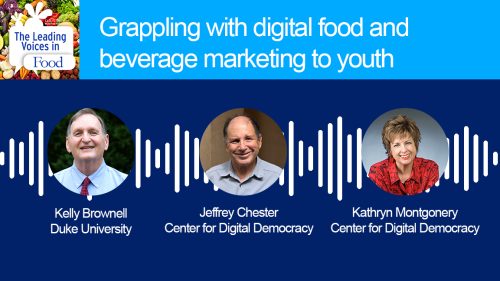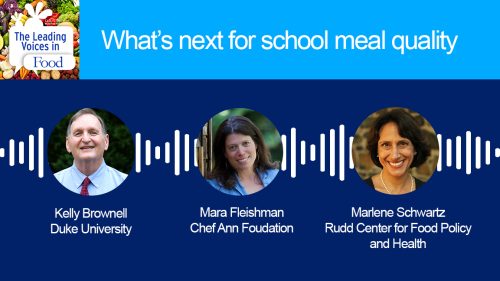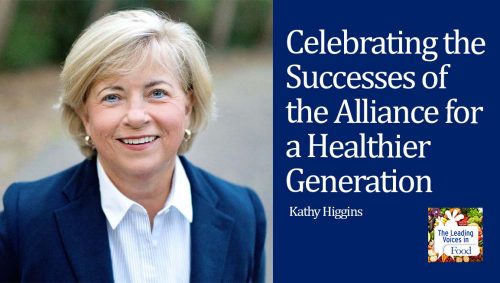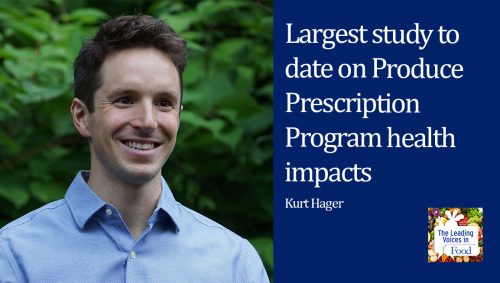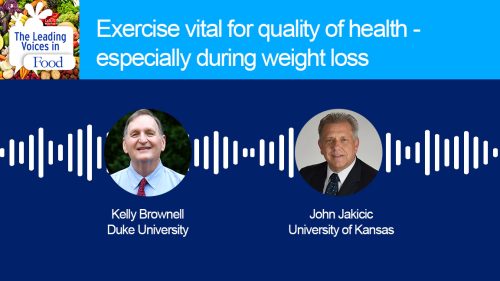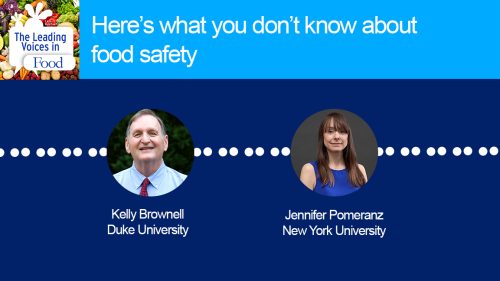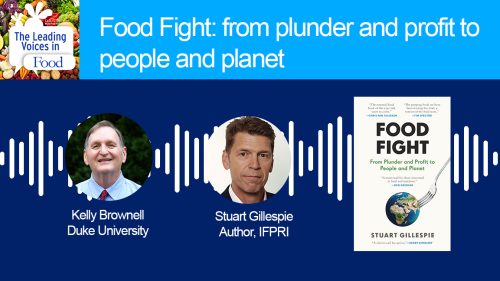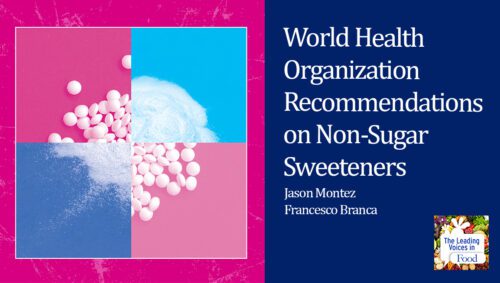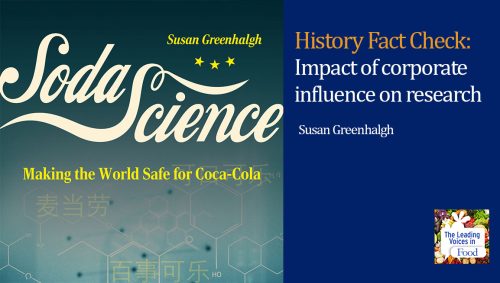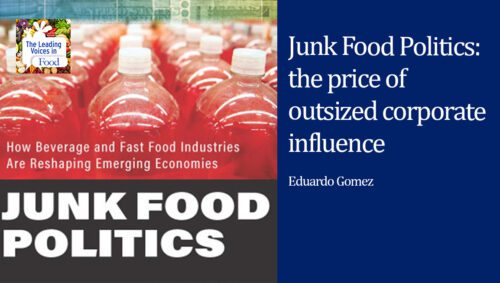The Leading Voices in Food
E7: Thomas Farley on the Real Returns of the Philadelphia Soda Tax
Today’s guest has had a fascinating career and has made significant contributions to public health in Louisiana, New York, and in Pennsylvania. He says he learned the true value of public health investigating syphilis and legionnaire’s disease outbreaks while working for the Center for Disease Control’s epidemic intelligence service. He’s worked on the front lines to prevent and control infectious diseases such as HIV and sexually transmitted diseases, and his research on obesity led him to see the obesity epidemic in our country as an outcome of an unhealthy environment. Dr. Thomas Farley is the Health Commissioner for the City of Philadelphia and he led work to pass a tax on sugar-sweetened beverages, seen widely as a significant success in health policy.
Subscribe: Apple Podcasts | TuneIN | YouTube Music | SoundCloud | PocketCasts | Radio Public
Tags: Advocacy & Food | Childhood Obesity | Diet & Nutrition | Food Industry Behavior & Marketing | Obesity | Soda Taxes |
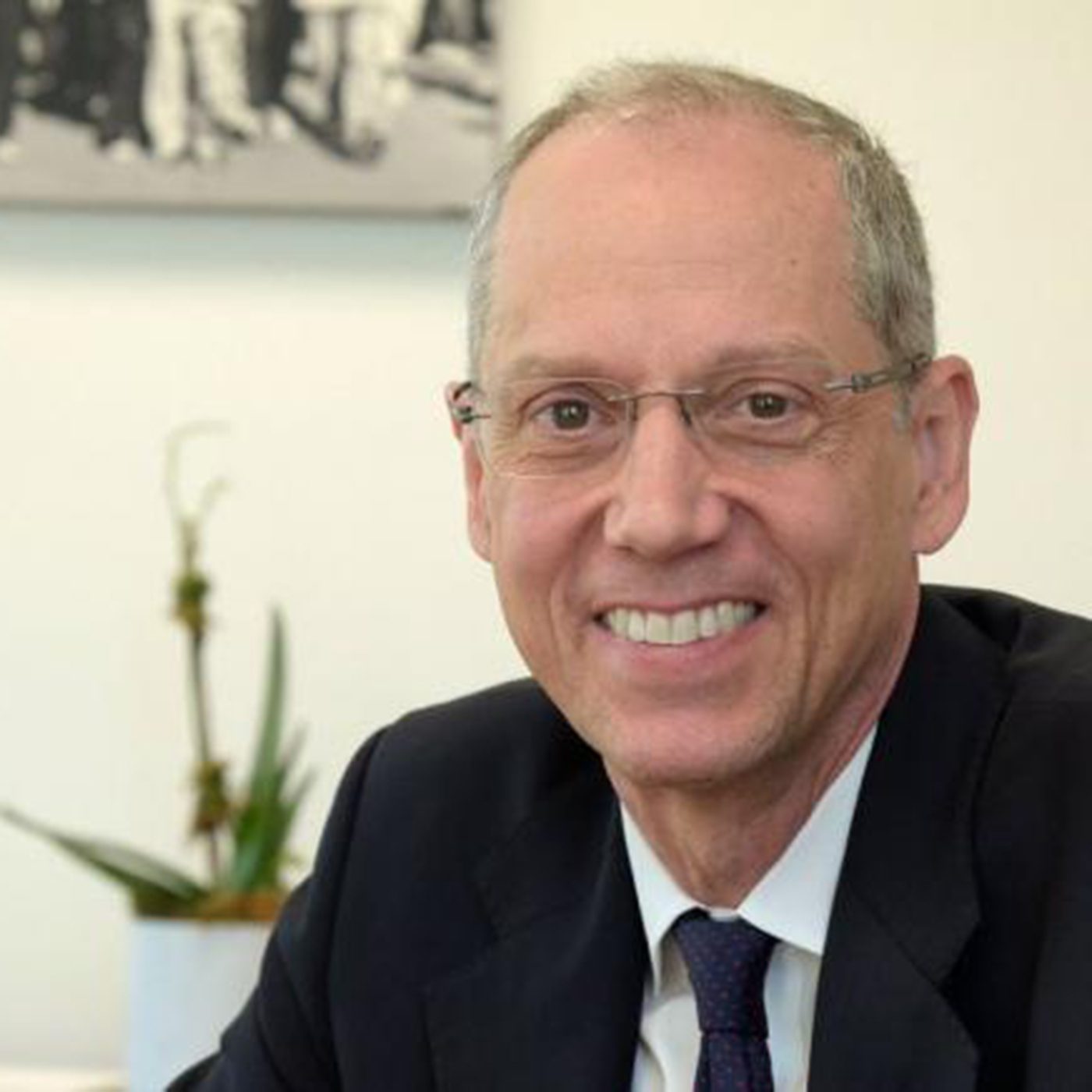
Tom Farley’s career includes serving as the Commissioner of Health for New York City under Mayor Michael Bloomberg. He’s the coauthor of a book entitled Prescription for a Healthy Nation: Improving our Lives by Fixing our Everyday World, and a popular history of public health in New York City during the Bloomberg years called Saving Gotham: A Billionaire Mayor, Activist Doctors, and the Fight for 8 Million Lives.
Interview Summary
Taxes on sugar-sweetened beverages now exist in a number of cities in the US and more than 25 countries. But Philadelphia made history of bypassing the largest tax in the United States. Can you explain the rationale for taxing sugary beverages?
Sure. We know that sugary beverages are a major source of added sugar in the diet. And there are now a large number of studies that show an association between consumption of sugary drinks and obesity weight. And there has been this very parallel major increase in consumption of sugary drinks in parallel with the rise in obesity in this country. A lot of reason to believe from all of that that sugary drinks play a major role in the obesity epidemic in the country. Not the entire problem, but a major role. So that therefore there are appropriate targets to really turn around this epidemic.
So why think about using taxes to decrease consumption as opposed to other possibilities like education, let’s say?
Well we don’t think that there’s an either or decision there. We think that we should be educating people about the risks of sugary drink. We also think that taxation makes sense. We’ve run mass media campaigns to educate people about the risk of sugary drink in New York City and elsewhere. And when we started people didn’t recognize how risky these were. We’ve made a lot of headway there. But we also know from our experience with smoking prevention that taxing a specific item could really make a big difference in terms of consumption. And so we think the tax is an appropriate companion with the education.
How high is the tax in Philadelphia and what did you choose to tax?
The tax is one and a half cents per ounce. So that means if you get a 20-ounce bottle of soda, that would be about 30 cents. Or if you get a two-liter bottle, which they tend to sell cheaper on a per ounce basis, it might add as much as one dollar to the overall price. The proposal from the mayor’s office, when this tax was first proposed in Philadelphia, was they would tax beverages with added sugar or added regular sweeteners. But the City Council wanted to also include artificial sweeteners. So the tax includes any beverage that includes sugar or high fructose corn syrup or artificial sweeteners.
Mayor Michael Nutter, Philadelphia’s previous mayor, came close to getting into tax passed but was not successful. But when Philadelphia’s current mayor, James Kenney took office, he used a different approach and the tax was passed. What did the two mayors do differently from one another?
Mayor Nutter actually took two tries at this. One time he proposed that the purpose of the tax was for health benefits–for people’s own health. Another time he tried to say that he had a major deficit and this would help with that deficit. Neither one of those really got a lot of public support. They didn’t like the idea of having taxation just to fill a deficit or I think there was a lot of skepticism about the value of the tax for people’s health. When Mayor Kenney came in on the third try, to a certain extent that groundwork had been laid–people understood the risks of sugary drink. But he tried a very different approach and he emphasized that the revenue would go towards things that people really cared about. Typically for expanded Pre-K for low income children and for rebuilding the city’s parks and recreation centers and libraries, which really needed a lot of additional renovations. And the public really responded to that. I was with him in the community meetings and talked to folks and people continued to have skepticism that this would have a real impact on obesity. But they saw that it made sense if it funded those things that they cared about, and they care very much about these centers.
You have been around this soda tax discussion for a long time and to say that the beverage companies are opposed would be an understatement. What have the company’s done in Philadelphia to try to fight the taxes?
Oh Gosh. Where to start? Every technique you can imagine. First they lobbied very, very hard. They mobilized the Teamsters, which are the people who drive the trucks that delivered beverage. They became their ground forces who held rallies. Teamsters took their trucks, and they did loops of city hall blaring their horn and shut down traffic there. They distributed flyers and mailings. Soda companies also brought in a variety of partners to do the speaking for them, particularly the grocery stores. Where the grocery stores were calling it a grocery tax and they were claiming that it was going to reduce the employment in the grocery industry. Soda companies also produced a series of a pseudo-scientific studies, and pseudo-economic studies about how ineffective and damaging this would be for the city. They wrote op-eds in the paper. They sued the city over the tax. They are now funding an effort to preempt the tax at the state level in Pennsylvania. And in the upcoming election, they’re funding opposition candidates to challenge the mayor and city council members. All this is costing them certainly in the millions, maybe tens of millions of dollars.
It’s hard to reconcile their arguments that the tax won’t work with how much money they’re spending the fight it.
Yeah, and it’s hard to reconcile their argument that this is somehow bad for the economy. If they took that, whatever it is: 10, 20, $30,000,000, and just employed people, Philadelphia would have a huge employment boom in the city.
With tobacco and also soda taxes elsewhere, it’s been common for the industry to create front groups with wholesome sounding names to be the spokespeople for these efforts to challenge the taxes. Does that happen in Philadelphia as well?
Yeah, absolutely. You don’t hear it being spoken on from the beverage company themselves–not from Coke and Pepsi. They created a group that I’ve forgotten its name, it’s something like that People For No Grocery Taxes or something like that. But it’s the beverage companies that are doing this. And they’re the ones coordinating all the efforts of all the other groups that are most prominent. But the voices that you hear the most from are the grocery stores. And that has gotten some success in persuading people in Philadelphia that the tax has been damaging to the grocery industry. Which it has not been. They managed to make some headway with that.
You mentioned one of the challenges the industry has filed is to stop the tax by challenging it in the courts. On what grounds did they challenge the tax and what was the outcome?
Well, the central claim was that this was effectively a sales tax. And the City of Philadelphia does not have the legal authority to pass a sales tax. But it’s not a sales tax. It’s a tax on the distributors of sugary drinks, and those distributors can choose to do what they want with it. They could pass the tax on in the prices that they charge their retailers. The retailers can choose, or not, to pass the tax on to the price to their customer. A sales tax is something that you apply right at the retail store and a customer says hey, this is different. But that was their claim, that this was effectively a sales tax. They also argued that this tax was not uniform, and it’s a principle in Pennsylvania and probably other laws that any tax has to be fair. You can’t say, well, I’m going to tax your house, but not the house next door. And you know, uniformity is in the eye of the beholder, but this was a tax on all sugary drinks in the city. They did not make any headway on the uniformity argument. And the sales tax argument went all the way to the Pennsylvania Supreme Court and the Supreme Court ruled in the city’s favor. This was not a sales tax. The city had the authority.
So is it too early to know what the impact of the tax has been on consumption of these beverages?
Now we’re getting a number of studies that are coming out that are giving a very consistent picture. First, in the work that we’ve been collaborators on, we see that sales of sugary drinks in the large grocery stores–the ones that have electronic scanners–have fallen by about 50 percent. Then in surveys that have been done with people on the street and through telephone surveys, self-reported consumption is down 35-45 percent. There is no question that this caused a big reduction in sales and consumption.
So what about the industry predictions that people would lose jobs and that consumers would flee across the Philadelphia border to buy their soda elsewhere?
Philadelphia has a long border and geographically it’s not a very large city. So it is easy for people to travel a few blocks to get into the suburbs. And the studies of grocery store sales suggest there are a small number of people that are making a small increase in grocery stores sales right at the border. But the overall grocery sector in the city has shown no loss of jobs and the overall food and beverage sector in the city has had continued job growth during this period. So again, there are many false claims that this has hurt the grocery store industry, but stores are doing just fine.
So what do you think the future of taxes will be?
I expect that this is something that other cities are going to see the success of Philadelphia and want to do. Now, the beverage companies clearly are fighting this not just for Philadelphia’s sake, but also to scare off other places. So there will be continued conflict. But, there’s no question that you can get through the conflict and it achieves at least the short term goal of reducing sugary drink consumption. And I’m very optimistic that it’s going to achieve a long term goal of helping to slow if not turn around the epidemic of obesity. So I believe you’re going hear a lot more about this.
You’ve been a real public health pioneer, not only was sugar beverage taxes, but in other areas as well. So it’s very nice of you to share the history of this story. And it’ll be interesting to see how it gets written as time goes forward. And I know that you’re going to be a central figure in those efforts, so thank you so much for joining us today.


